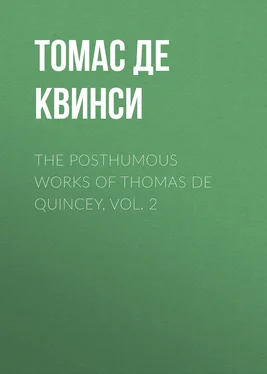Томас Де Квинси - The Posthumous Works of Thomas De Quincey, Vol. 2
Здесь есть возможность читать онлайн «Томас Де Квинси - The Posthumous Works of Thomas De Quincey, Vol. 2» — ознакомительный отрывок электронной книги совершенно бесплатно, а после прочтения отрывка купить полную версию. В некоторых случаях можно слушать аудио, скачать через торрент в формате fb2 и присутствует краткое содержание. Жанр: foreign_prose, literature_19, foreign_antique, на английском языке. Описание произведения, (предисловие) а так же отзывы посетителей доступны на портале библиотеки ЛибКат.
- Название:The Posthumous Works of Thomas De Quincey, Vol. 2
- Автор:
- Жанр:
- Год:неизвестен
- ISBN:нет данных
- Рейтинг книги:3 / 5. Голосов: 1
-
Избранное:Добавить в избранное
- Отзывы:
-
Ваша оценка:
- 60
- 1
- 2
- 3
- 4
- 5
The Posthumous Works of Thomas De Quincey, Vol. 2: краткое содержание, описание и аннотация
Предлагаем к чтению аннотацию, описание, краткое содержание или предисловие (зависит от того, что написал сам автор книги «The Posthumous Works of Thomas De Quincey, Vol. 2»). Если вы не нашли необходимую информацию о книге — напишите в комментариях, мы постараемся отыскать её.
The Posthumous Works of Thomas De Quincey, Vol. 2 — читать онлайн ознакомительный отрывок
Ниже представлен текст книги, разбитый по страницам. Система сохранения места последней прочитанной страницы, позволяет с удобством читать онлайн бесплатно книгу «The Posthumous Works of Thomas De Quincey, Vol. 2», без необходимости каждый раз заново искать на чём Вы остановились. Поставьте закладку, и сможете в любой момент перейти на страницу, на которой закончили чтение.
Интервал:
Закладка:
Kindliness of heart, no doubt, remained to the last with Mr. Walker, that being secured by the universal spirit of brotherly and social feeling amongst the dalesmen of the lake district. He was even liberal and generous, if we may rely upon the few instances reported by W. W. His life of heroic money-getting had not, it seems, made his heart narrow in that particular direction, though it must not be forgotten that the calls upon him were rare and trivial. But however that may have been, the heart of stone had usurped upon the heart of flesh in all that regarded the spiritualities of his office. He was conscientious, we dare say, in what related to the sacramentum militaire (as construed by himself) of his pastoral soldiership. He would, perhaps, have died for the doctrines of his church, and we do not like him the worse for having been something of a bigot, being ourselves the most malignant of Tories (thank Heaven for all its mercies!). But what tenderness or pathetic breathings of spirituality could that man have, who had no time beyond a few stray quarters of an hour for thinking of his own supreme relations to heaven, or to his flock on behalf of heaven? How could that man cherish or deepen the motions of religious truth within himself, whose thoughts were habitually turned to the wool market? Ninety and odd years he lived on earth labouring like a bargeman or a miner. Assuredly he was not one of the fainéans . And within a narrow pastoral circle he left behind him a fragrant memory that will, perhaps, wear as long as most reputations in literature. Nay, he even acquired by acclamation a sort of title, viz., the posthumous surname of the wonderful ; pointing, however, we fear, much less to anything in himself than to the unaccountable amount of money which he left behind him—unaccountable by comparison with any modes of industry which he practised, all of which were indomitably persevering, but all humble in their results. Finally, he has had the honour (which, much we fear, men far more interesting in the same situation, but in a less homely way, never would have had) of a record from the pen of Wordsworth. We and others have always remarked it as one of the austere Roman features in the mind of Wordsworth, that of all poets he has the least sympathy, effeminate or not effeminate, with romantic disinterestedness. He cannot bear to hear of a man working by choice for nothing, which certainly is an infirmity, where at all it arises from want of energy or of just self-appreciation, but still an amiable one, and in certain directions a sublime one. Walker had no such infirmity. He laboured in those fields which ensure instant payment. Verily he had his reward: ten per cent., at least, beyond all other men, without needing to think of reversions, either above or below. The unearthly was suffocated in him by the earthly. Let us leave him, and return to a better man, viz., to the Rev. John Coleridge, author of the Quale-quare-quidditive case—a man equal in simplicity o£ habits and in humility, but better in the sight of God, because he laboured in the culture of his higher and not his lower faculties.
Mr. John Coleridge married a second time; and we are perplexed to say when . The difficulty is this: he had by his second wife ten children. Now, as the Coleridge, the youngest of the flock, was born in 1772, the space between that year and 1760 seems barely adequate to such a succession of births. Yet, on the other hand, before 1760 he could not probably have seen his second wife, unless, indeed, on some casual trip to Devonshire. Her name was Anne Bowden; and she was of a respectable family, that had been long stationary in Devonshire, but of a yeomanly rank; and people of that rank a century back did not often make visits as far as Southampton. The question is not certainly of any great importance; and we notice it only to make a parade of our chronologic acumen. Devilish sly is Josy Bagstock! It is sufficient that her last child was her illustrious child; and, if S. T. C.'s theory has any foundation, we must suppose him illustrious because he was the last. For he imagines that in any long series of children the last will, according to all experience, have the leonine share of intellect. But this contradicts our own personal observation; and, besides, it seems to be unsound upon an à priori ground, viz., that to be the first child carries a meaning with it: that place in the series has a real physiologic value; and we have known families in which, from generation to generation, the first-born child had physical advantages denied to all that followed. But to be the last child must very often be the result of accident, and has in reality no meaning in any sense known to nature. The sixth child, let us suppose, is a blockhead. And soon after the birth of this sixth child, his father, being drunk, breaks his neck. That accident cannot react upon this child to invest him with the privileges of absolute juniority. Being a blockhead, he will remain a blockhead. Yet he is the youngest; but, then, nature is no party to his being such, and probably she is no party (by means of any physical change in the parents) once in a thousand births to a case of absolute and predeterminate juniority.
Whether with or without the intention of nature, S. T. C. was fated to be the last of his family. He was the tenth child of the second flock, and possibly there might have been an eleventh or even a twentieth, but for the following termination of his father's career, which we give in the words of his son. 'Towards the latter end of September, 1781, my father went to Plymouth with my brother Francis, who was to go out as' (a) 'midshipman under Admiral Graves—a friend of my father's. He settled Frank as he wished, and returned on the 4th of October, 1781. He arrived at Exeter about six o'clock, and was pressed to take a bed there by the friendly family of the Harts; but he refused, and, to avoid their entreaties, he told them that he had never been superstitious, but that the night before he had had a dream, which had made a deep impression on him. He dreamed that Death had appeared to him, as he is commonly painted, and had touched him with his dart. Well, he returned home; and all his family, I excepted, were up. He told my mother his dream; but he was in good health and high spirits; and there was a bowl of punch made, and my father gave a long and particular account of his travels, and that he had placed Frank under a religious captain, and so forth. At length he went to bed, very well and in high spirits. A short time after he had lain down, he complained of a pain to which he was subject. My mother got him some peppermint water, which he took; and after a pause he said, "I am much better now, my dear!" and lay down again. In a minute my mother heard a noise in his throat, and spoke to him; but he did not answer, and she spoke repeatedly in vain. Her shriek awaked me, and I said, "Papa is dead!" I did not know of my father's return, but I knew that he was expected. How I came to think of his death, I cannot tell; but so it was. Dead he was. Some said it was gout in the heart; probably it was a fit of apoplexy. He was an Israelite without guile, simple, generous; and, taking some Scripture texts in their literal sense, he was conscientiously indifferent to the good and evil of this world.'
This was the account of his father's sudden death in 1781, written by S. T. Coleridge in 1797. 'Thirty years afterwards' (but after 1781 or after 1797?), says Mr. H. N. Coleridge, 'S. T. C. breathed a wish for such a death, "if," he added, "like him I were an Israelite without guile!" and then added, "The image of my father, my revered, kind, learned, simple-hearted father, is a religion to me."'
In his ninth year, therefore, thus early and thus suddenly, Coleridge lost his father; and in the result, though his mother lived for many a year after, he became essentially an orphan, being thrown upon the struggles of this world, and for ever torn from his family, except as a visitor when equally he and they had changed. Yet such is the world, and so inevitably does it grow thorns amongst its earliest roses, that even that dawn of life when he had basked in the smiles of two living parents, was troubled for him by a dark shadow that followed his steps or ran before him, obscuring his light upon every path. This was Francis Coleridge, one year older, that same boy whom his father had in his last journey upon earth accompanied to Plymouth.
Читать дальшеИнтервал:
Закладка:
Похожие книги на «The Posthumous Works of Thomas De Quincey, Vol. 2»
Представляем Вашему вниманию похожие книги на «The Posthumous Works of Thomas De Quincey, Vol. 2» списком для выбора. Мы отобрали схожую по названию и смыслу литературу в надежде предоставить читателям больше вариантов отыскать новые, интересные, ещё непрочитанные произведения.
Обсуждение, отзывы о книге «The Posthumous Works of Thomas De Quincey, Vol. 2» и просто собственные мнения читателей. Оставьте ваши комментарии, напишите, что Вы думаете о произведении, его смысле или главных героях. Укажите что конкретно понравилось, а что нет, и почему Вы так считаете.











